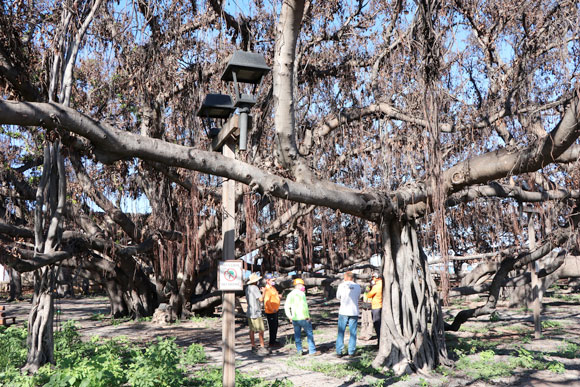Members of the Lāhainā Treescape Restoration Project meet at the historic Banyan Tree on Sept. 29, 2023. PHOTO COURTESY OF DLNR.
LĀHAINĀ — Experts are encouraging residents across the state to retain valuable trees around their homes, contrary to misinformation circulating in the Maui wildfires’ wake. Healthy, viable trees, especially native varieties, enhance environmental health and help mitigate fire risk.
For three days, Jake Kane watched piles of mulch smolder and smoke after it ignited in the Aug. 8 wildfire. The mulch was used in his work as owner of Kane’s Legacy Tree Services. Days after the fire that devastated Lāhainā, Maui County firefighters were still pouring thousands of gallons on the stubborn, burning layers of mulch.
That was the most visible sign of what he lost, but there was much more.
“We lost our entire two-acre base yard on the corner of the Lāhainā Bypass Road and Hokiokio Street. Seven trucks, three chippers, two trailers, a backhoe, a skid steer, a tractor and a tub grinder,” Kane said. An employee living on the property escaped with just the shirt on his back.
Despite all that, Kane is helping as one of the experts involved in the Lāhainā tree recovery efforts. He’s also one of the volunteer arborists and landscape professionals who have received calls from homeowners wanting to cut down all the trees around their houses.
At a spot just above Lāhainā Town, Kane exclaimed, “No, no, you can’t really tell from here, but we lost 20,000 or more trees in the fire. We need all the trees we can get right now just to keep our environment healthy. Trees are great filters. Properly maintained trees in the right spots don’t pose a fire hazard. A lot of the trees that burned caught fire because the house was on fire. Trees are not necessarily entry points for fire to your home.”
Social media posts following the fire seemed to fuel the notion, and the calls that people should chop their trees down.
“We’ve been able to sway some people, and the others we tell we’re not interested in removing non-hazardous trees. If it’s the wrong tree in the wrong spot, absolutely. Always replace with the right tree in the right spot,” Kane added.
Duane Sparkman, who is coordinating the Lāhainā Treescape Restoration Project, commented, “A lot of folks are getting very reactive right now. They’re going and cutting down trees thinking that trees will burn their house. What we’re finding is the house burned the tree. We’re trying to get people to understand to keep your trees big, maintain the shade load, keep moisture on it, and clean the dry stuff off the ground, like leaf piles.”
He explained the concept of fire laddering. It involves removing material that grows on a tree from the ground up to the canopy. It creates a nice, big shade layer, and there’s no place for embers to land and ignite up the tree. It prevents it from climbing the ladder.
The entire group working to save and restore Lāhainā’s urban forest are focusing on native trees that are typically more fire-resistant than introduced species. It’s not just about aesthetics but a necessity.
Sparkman said, “To be honest, if we can change a town’s heat load, change the humidity factor with the presence of healthy, viable trees, we can prevent fires, or at least slow down their movement. That’s the future we’re all aiming for.”
www.lahainanews.com
https://www.lahainanews.com/news/local-news/2023/10/12/arborists-debunk-tree-cutting-advice-following-maui-wildfires/














